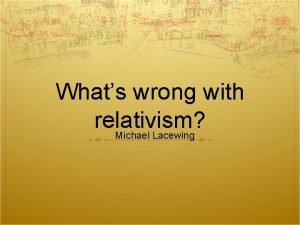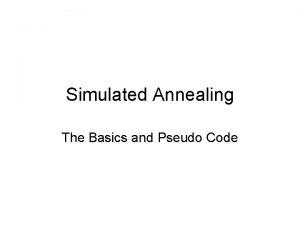Simulated killing Michael Lacewing enquiriesalevelphilosophy co uk Michael












- Slides: 12

Simulated killing Michael Lacewing enquiries@alevelphilosophy. co. uk © Michael Lacewing

Simulated killing • The dramatisation, i. e. enactment, of killing within a fictional context, e. g. in video games, films and plays – Playing the killer – Witnessing a killing • Why worry? It’s ‘just a game’ – If simulated killing is wrong, obviously it is not for the same reasons that killing is wrong – Is any representation morally ok, e. g. rape? – What are the real effects of simulated killing? © Michael Lacewing

PLAYING THE KILLER © Michael Lacewing

Utilitarianism • Act utilitarianism: an action is right if it maximises happiness, and wrong if it does not • Could simulated killing lead to real harm, e. g. an increased risk of killing, aggressive behaviour, becoming less responsive to distress, approval of violence? – This is an empirical claim – Evidence: yes, in the short term, though perhaps only in boys or people with violent personalities (Young, Ethics in the Virtual World) – No, in the long term (perhaps, for some people) © Michael Lacewing

Utilitarianism • Any real harm must be weighed against real pleasure of playing the game • Common morality: simulated killing is widely considered normal development • But is it ‘childish’? – So what? – Lower pleasure? © Michael Lacewing

Kantian deontology • ‘Act only on that maxim through which you can at the same time will that it should become a universal law’ • ‘Act in such a way that you always treat humanity, whether in your own person or in the person of any other, never simply as a means, but always at the same time as an end’ • Playing the killer is no violation of one’s duty, but damaging one’s rational will is – Could cruel fictional actions encourage real cruelty? The evidence doesn’t support this – Could we fail to develop our moral identity? © Michael Lacewing

Virtue ethics • Virtues are traits that help us achieve eudaimonia – ‘living well and faring well’ • We become just by doing just acts – Killing is often an unjust act – But why think that simulating unjust acts will develop an unjust character? • Would a virtuous person engage in simulated killing? – What is the right way, the right motive, the right times? – Should we take pleasure from simulated killing? Can we enjoy such pleasures virtuously, e. g. is it within a narrative structure or the point of the game? © Michael Lacewing

Game and reality • The ‘mean’ is relative to the individual – Someone who cannot keep the game and reality separate should not play • Evidence again: perhaps someone who can draw both a conceptual and emotional distinction is not at risk of real psychological effects © Michael Lacewing

Acting the killer • Actors don’t imitate real-life killings, but pretend to kill according to agreed conventions • Actors don’t feel genuine rage (etc), but at most, fictional counterparts – To feel genuine emotions would blur the boundary between the character’s psychology and the actor’s © Michael Lacewing

AN AUDIENCE’S PERSPECTIVE © Michael Lacewing

Make-belief • With fiction, we ‘make-believe’ that we see is real – Is it wrong to make-believe a killing? • Killing is sometimes right – What can be wrong with engaging fictionally with a morally right killing? – But what about morally wrong killings? • Utilitarianism: depends on consequences © Michael Lacewing

Morality in fiction • A simulated immoral killing can be presented as immoral, the killer as wretched • Or it can be presented as moral – the morality of the work of fiction disagrees with our own – Is it wrong to imagine that what is immoral is moral? – What does the author intend? • We need to be able to keep our ‘moral distance’ © Michael Lacewing























